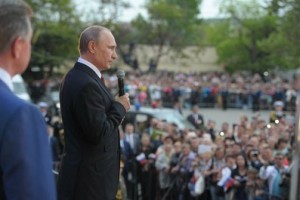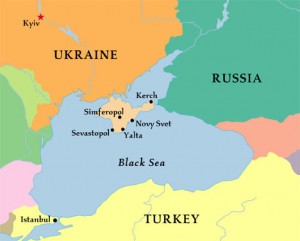The following piece was written by retired Col. Ann Wright, a participant on the CCI June 2016 trip to Russia. It’s based in part on her observations during the Crimea portion of that trip.
The mainstream U.S. reporting on the Ukraine crisis has been as biased and imbalanced as any in recent memory, leaving many Americans confused about what the on-the-ground reality is, as retired Col. Ann Wright discovered.
By Ann Wright
Most Americans don’t have a clue what has happened in a place called Crimea or why it is on the frontlines of what is becoming a new Cold War. In fact, few even know where it is. But Crimea’s location has made it one of the most frequent battlegrounds of empires — and today is no exception.
Some Americans may remember Crimea through Alfred, Lord Tennyson’s poem “Charge of the Light Brigade” about the slaughter of a British cavalry unit as it charged into a devastating crossfire from Russian artillery and riflemen during the 1854 Crimean War, a disastrous attack immortalized in some of the most infamous words of war…
“Theirs not to reason why,
Theirs but to do and die.
Into the valley of Death
Rode the six hundred…
Into the jaws of Death,
Into the mouth of hell
Rode the six hundred.”
However, fewer Americans probably remember that in 1941, the Nazis mounted a 250-day siege of the Crimean city of Sevastopol, in which the Soviet forces suffered some 26,000 soldiers killed and 95,000 taken prisoner, including about two-thirds wounded. The Germans and their Axis allies also suffered heavy casualties and the delay in capturing Sevastopol contributed to Germany’s decisive defeat at Stalingrad in 1943.
As the Nazis were forced into a westward retreat, the Soviet Union regained control of Crimea. With the Nazi occupation ended, Soviet leader Josef Stalin deported about 230,000 inhabitants of Crimea to Central Asia. The mass deportation removed about one-fifth of the total population, mostly Tatars, as a collective punishment for alleged Nazi collaboration. Over the ensuing years, Crimea was repopulated by ethnic Russians.
In 1954, the Soviet government assigned Crimea to Ukraine, one of the Soviet republics, and Crimea remained part of Ukraine when it became a separate country following the break-up of the Soviet Union in 1991. But the population was resistant to being politically absorbed into Ukraine. A 1991 referendum favored making Crimea an autonomous zone and a 1994 referendum sought greater autonomy from Ukraine.
Coup Plotting
Crimea regained the world’s attention in 2014 after a U.S.-backed coup against the elected government of Ukraine. In the weeks before the coup, U.S. involvement was exposed in an intercepted phone call between Assistant Secretary of State Victoria Nuland and Geoffrey Pyatt, U.S. Ambassador to Ukraine.
Nuland castigated the European Union’s hesitancy to support demonstrators in the Maidan Square who were spearheading the ouster of elected President Viktor Yanukovych. “Fuck the E.U.,” Nuland declared as she and Pyatt discussed who should become Ukraine’s new leaders. “Yats is the guy,” Nuland said in reference to Arseniy Yatsenyuk, who would emerge as prime minister after the coup.
The coup on Feb. 22, 2014, brought to power a right-wing Ukrainian nationalist government hostile to the country’s ethnic Russian minority with the parliament voting to remove Russian as an official language. Amid the post-coup chaos and violence, the leaders of Crimea called for a referendum to decide whether Crimea should secede from Ukraine and reunite with Russia.
On March 16, 2014, more than 80 percent of the voters participated and some 96 percent favored rejoining Russia, a decision that the Russian government accepted. The Russian Federation formally annexed Crimea six days after the vote. Because Russia’s southern naval fleet is located in Crimea at Sevastopol, Russia gave as its rationale for annexing Crimea – beyond the overwhelming result of the referendum – the national security necessity of protecting the port and fleet from anti-Russian forces.
However, the United States and its Western allies denounced Crimea’s referendum, called the annexation a violation of international law, and imposed sanctions on Russia and Crimea. The E.U. sanctions prohibited investment in Crimea, infrastructure, assistance to Russian oil and gas exploration in the Black Sea, and certain tourist activities in Crimea. The U.S. sanctions prohibited new investments in Crimea; the import and export of goods, technology and services from or to Crimea; and the purchase of real estate in Crimea and blocked certain individuals from coming to the U.S.
A Firsthand Examination
Despite those restrictions and a U.S. government travel advisory against visiting Crimea, I took part in a 20-person delegation (19 Americans and one Singaporean) who went to see for ourselves what had happened there and to speak with as many residents as we could. Ours was the first international delegation to visit Crimea from the United States in over two years.

Organized through the Center for Citizen Initiatives, our delegation met with government officials, business people, veterans of World War II and the Soviet-Afghan war, students and Crimean Tatars. We spoke with people who voted for reunification with Russia and some who did not.
The sanctions have been successful in destroying the tourism business in Crimea. Most visitors had arrived in Crimea by cruise ships from Turkey and Greece through the Bosporus Straits into the Black Sea to the Crimean ports of Yalta or Sevastopol. Annually, over 260 cruise ships dock in Crimea, but for the past two years none have arrived, thereby decimating the international tourist industry. However, travel by Russian citizens to Crimea has increased.
Before the referendum, international visitors could fly to Crimea directly from Europe. However, under the E.U. sanctions, European airlines no longer fly into Crimea. International visitors can fly into Crimea only from Russian cities.
Sanctions on use of international credit cards and on cell-phone technologies had the most striking impact on daily life in Crimea. Now, two years later, some international credit cards will work in Crimea, but cell-phone service is spotty. Travel for citizens of Crimea is more difficult as they must obtain a Russian Federation passport. Individuals said it is harder to travel with a Russian passport and particularly from Crimea.
After the referendum, the interim Ukrainian government cut off electrical power to Crimea and, more recently, several electric transmission stations were blown up by right-wing Ukrainian nationalists forcing Crimean businesses and families to get generators. Russia eventually provided a massive electric power grid bringing electricity into Crimea from Russia.
Russia is also constructing a $3.2 billion, 19-kilometer (11.8 miles) bridge that will connect Crimea directly with Russia.
Collective Punishment
For its part, the U.S. government canceled programs that were available to people in Crimea when it was a part of the Ukraine. Peace Corps volunteers were removed and school construction projects by U.S. military units ended. U.S.-funded professional exchange programs stopped as did U.S. agricultural and law enforcement projects.
Some with the Crimeans with whom we spoke regretted the loss of contact with the United States and its programs, particularly its exchange programs. One educator lamented the difficulty in finding exchange programs for high school and college students in the Crimea to live and learn in the United States. Graduates of universities in Crimea are finding that some educational institutions outside of Russia are no longer recognizing their diplomas and certificates because of the sanctions.
Educators said they do not want to be isolated from the world. They asked that our delegation assist in finding professional and educational exchanges with educational institutions and civic organizations in the United States.
One local official expressed great concern about the negative reaction of the international community to the decision by Crimeans to reunite with Russia, compared with the lack of criticism for the overthrow of Ukraine’s elected government in 2014. She believed that without the coup there never would have been a referendum in Crimea and a subsequent annexation by Russia.
She asked, “Why isn’t the international community focusing on the overthrow?”
Crimeans noted that many of the sanctions were not aimed at Russia itself, but just Crimea – to teach the citizens of Crimea a lesson, they told us.
Ann Wright served 29 years in the U.S. Army/Army Reserves and retired as a Colonel. She was a U.S. diplomat for 16 years and served in U.S. Embassies in Nicaragua, Grenada, Somalia, Uzbekistan, Kyrgyzstan, Sierra Leone, Micronesia, Afghanistan and Mongolia. She resigned from the U.S. government in March 2003 in opposition to the war on Iraq. She is the co-author ofDissent: Voices of Conscience.


